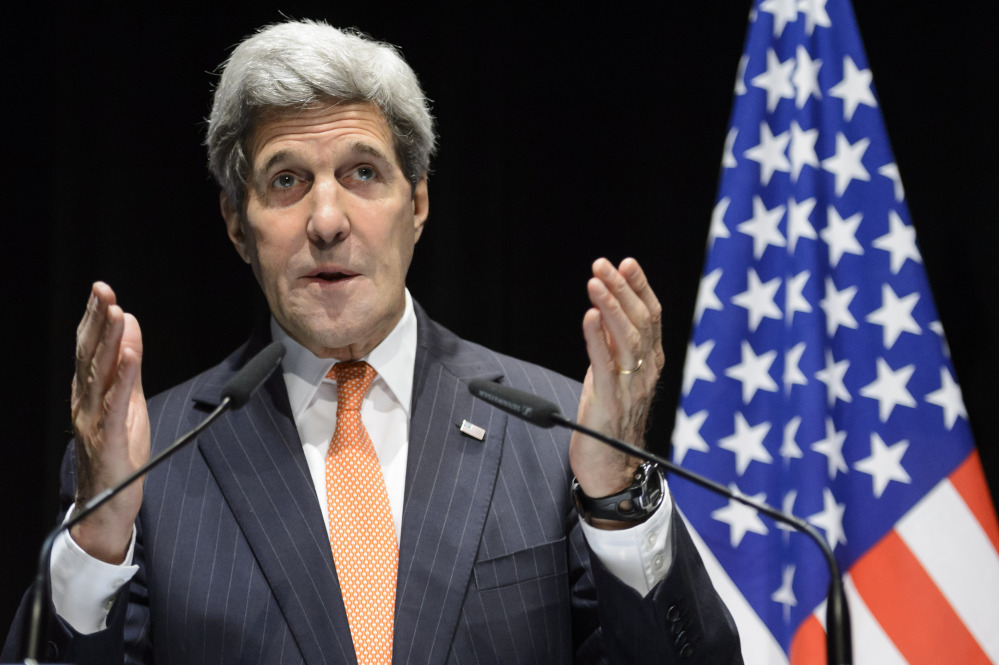LAUSANNE, Switzerland —The United States and Iran reported significant progress Saturday toward a nuclear agreement, with the Iranian president declaring a deal within reach. America’s top diplomat was more reserved, leaving open whether world powers and Tehran would meet a March 31 deadline.
Speaking after a week of nuclear negotiations in Switzerland, U.S. Secretary of State John Kerry challenged Iran to make “fundamental decisions” that prove to the world it has no interest in atomic weapons. Amid conflicting statement by officials about how close the sides were, Kerry said, “We have an opportunity to try to get this right.”
The talks “have made substantial progress,” Kerry told reporters, “though important gaps remain.” Talks with Iran resume next week.
In Tehran, Iranian President Hassan Rouhani was more optimistic. “Achieving a deal is possible,” he said. “There is nothing that can’t be resolved.”
Other negotiators offered both positive and negative assessments. Top Russian negotiator Sergey Ryabkov and Iran’s atomic energy chief Ali Akbar Salehi said in recent days that technical work was nearly done. But French officials said the opposite, declaring the sides far from any agreement.
Kerry was departing later Saturday to meet with European allies in London, before returning to Washington, in part to ensure unity. Kerry said the U.S. and its five negotiating partners – Britain, China, France, Germany and Russia – are “united in our goal, our approach, our resolve and our determination.”
But France, which raised last minute objections to an interim agreement reached with Iran in 2013, could threaten a deal again. It is particularly opposed to providing Iran with quick relief from international sanctions and wants a longer time frame for restrictions on Iran’s nuclear activity.
On Twitter Friday, France’s ambassador to the U.S. called talk about needing a deal by March 31 a “bad tactic” that is “counterproductive and dangerous.” Gerard Araud called it an “artificial deadline” and said negotiators should focus instead on the next phase – reaching a complete agreement by the end of June.
Kerry said the U.S. wasn’t rushing into a pact, stressing that the latest stab at a diplomatic settlement with Iran has gone on for 21/2 years. “We don’t want just any deal,” he said. “If we had, we could have announced something a long time ago.”
But, he added, decisions “don’t get any easier as time goes by.”
“It’s time to make hard decisions,” Kerry said. “We want the right deal that would make the world, including the United States and our closest allies and partners, safer and more secure. And that is our test.”
Washington has yet to say what it will do if talks miss the March deadline, but the stakes are high. The Obama administration has warned that a diplomatic failure could lead to an ever tougher dilemma: Whether to launch a military attack on Iran or allow it to reach nuclear weapons capacity.
A more immediate challenge may be intervention from Congress. If American lawmakers pass new economic sanctions on Iran, the Islamic Republic could respond by busting through the interim limits on its nuclear program it agreed to 16 months ago. Thus far, it has stuck to that agreement.
Send questions/comments to the editors.



Success. Please wait for the page to reload. If the page does not reload within 5 seconds, please refresh the page.
Enter your email and password to access comments.
Hi, to comment on stories you must . This profile is in addition to your subscription and website login.
Already have a commenting profile? .
Invalid username/password.
Please check your email to confirm and complete your registration.
Only subscribers are eligible to post comments. Please subscribe or login first for digital access. Here’s why.
Use the form below to reset your password. When you've submitted your account email, we will send an email with a reset code.